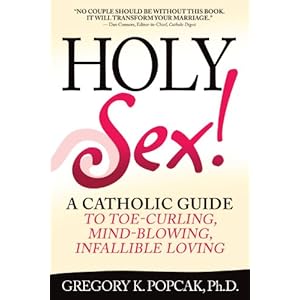![images[5]](https://wp.patheos.com.s3.amazonaws.com/blogs/faithonthecouch/files/2013/03/images51-150x150.jpg) With the conclave and election of the new Pope, celibacy was front and center in the news. Will it change? What’s it all about? Can it be healthy?
With the conclave and election of the new Pope, celibacy was front and center in the news. Will it change? What’s it all about? Can it be healthy?
Why is it so hard for the world to “get” what Catholics are trying to say through the witness of celibacy. Dr. Wanda Poltawska of the Pontifical Academy of Krakow argues that the world struggles with the possibility of a healthy celibacy because for the lay person, celibacy is usually imposed but for the priest or religious, celibacy is chosen. Choosing something freely certainly doesn’t make it easy, but it does make it desireable and worthwhile. Since most laypersons–especially non-believing laypersons– can’t imagine a situation in which they would choose celibacy, they constantly struggle to understand how it could possibly be healthy or desireable.
That points, of course, to a missed opportunity for evangelism. It would be good if we, and especially the priests who live celibacy, would do more to communicate why celibacy is a worthwhile gift to the world. The celibate doesn’t give up connection with others. The celibate must strive to make a more radical connection to others. If marriage witnesses to the spousal union God desires with us, celibacy points to the spousal union God already enjoys with the whole communion of saints. The gift of celibacy isn’t just that it allows a priest to do more stuff for the Church. The more important point of the gift of celibacy is that it points to the spousal union enjoyed by the whole communion of saints–the total union hinted at by earthly marriage but that supersedes marriage in Heaven.
Of course, all this fails to address the question, “Is it possible for celibacy to be healthy?”
Clinical Psychologist and psychology professor Fr. Sonny Manuel, S.J., has a book called Living Celibacy: Healthy Pathways for Priests . In it, he decribes interviews he has done with priests that identify 5 key factors that enable celibacy to be healthy.
1. Live Close to God and the Celibate’s “Deepest Longings”
Rev. Dr. Manuel asserts that to be a healthy celibate requires an active, personal prayer life and an active effort to remain mindful of the deepest longings for intimacy with God that prompted the decision to live a celibate life to begin with. Much like a married couple must recall what made them fall in love with each other so that they can remember what all the sacrifice of marriage is for, a priest must intentionally recall the longing that drew him to seek God first above all else and translate all other desires through that first and deepest longing.
2. Develop Broad and Deep Relationships and Communities of Support.
The short version is that healthy priests don’t isolate. They are involved with their parishioners, and have vibrant relationships with their brother priests. Celibacy can’t be a means of hiding from connection from people. It has to be a catalyst for pursuing even deeper engagement with people.
3. Ask for Love, Nurture Others, and Negotiate Separation
Healthy celibacy requirest that priest or religious be capable to being a generous servant to others, be comfortable receiving and even asking for loving care from others in return and having the maturity to keep these two drives of generativity and receptivity in balance. If one is only a servant to others, one will burn out and become resentful. If one only takes from others, one become narcissistic. Finding the balance between these two extremes allows a priest to achieve a healthy and appropriate intimacy with others that enables him to be a minster and a human being.
4. Cope with Stress and Recognize Destructive Patterns of Behavior
It is easy, under stress, to lean too heavily on the feelings one gets from being in relationship with others to give me the illusion of health and well-being without actually doing the work of taking care fo my own stuff. That can turn a minister into a user or even a predator. Having healthy ways to cope with stress and problems prevents this from happening. Fr. Manuel suggests many ways to accomplish this in his book.
5. Celebrate the Holy in the Company of Jesus.
Fr. Manuel argues that a healthy celibacy is rooted in ongoing spiritual discipline and development. Just like a married couple must continue to work on their marriage every day in order for that marriage to be great and lifegiving, a priest must commit to daily spiritual exercises to keep his relationship with God and his commitment to his ministry in a good and lifegiving place.
What I find refreshing about Fr. Manuel’s work is that it presents a positive, healthy, and realistic view of the challenges and strategies for living a healthy celibacy. Hopefully, this little summary gives FaithontheCouch readers a clearer sense of what a healthy celibacy looks like.

